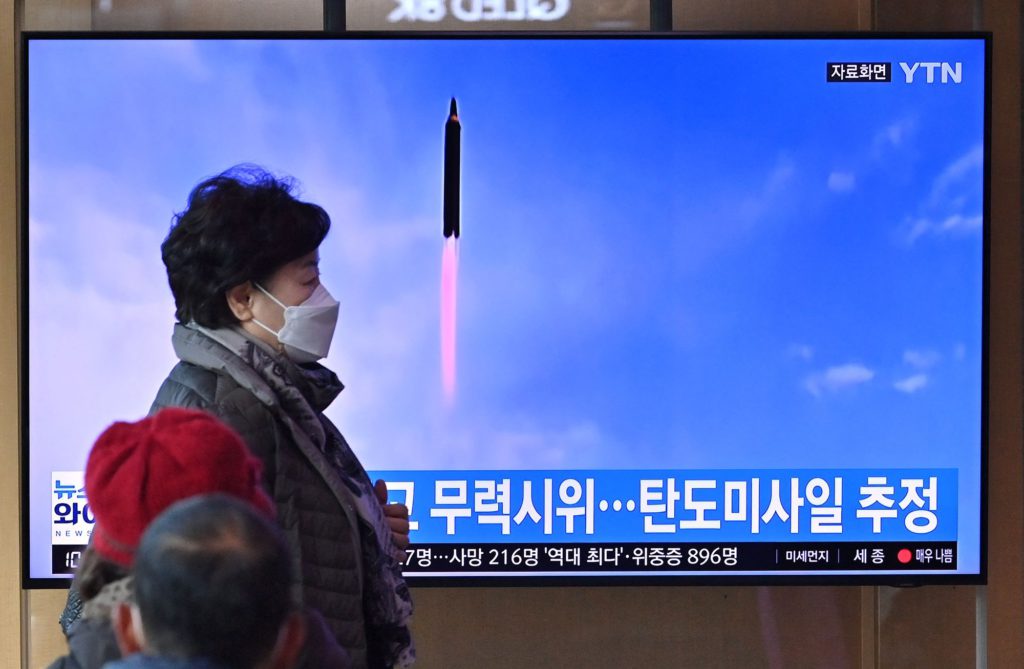(Bloomberg) — The U.S. is preparing new penalties against North Korea after determining that a pair of purported satellite launches by Kim Jong Un’s regime were used to test systems for a long-anticipated new ICBM.
The restrictions would aim to further block North Korea’s purchase of foreign technologies, a senior Biden Administration official told reporters Thursday, without providing more details. The U.S. Indo-Pacific Command was also intensifying surveillance activity in the Yellow Sea and increasing readiness for ballistic-missile defense forces in the region, Pentagon spokesman John Kirby said in a separate statement.
American officials are concerned that North Korean launches on Feb. 26 and March 4 were intended to test elements of an intercontinental ballistic missile that weapons experts believe could be armed with multiple warheads in a bid to overwhelm missile defenses. While North Korea claimed it was “developing a reconnaissance satellite,” Kirby said the U.S. government believed the launches were a step toward testing the missile, which Kim first unveiled in an October 2020 military parade.
“The purpose of these tests, which did not demonstrate ICBM range, was likely to evaluate this new system before conducting a test at full range in the future, potentially disguised as a space launch,” Kirby said.
North Korea hasn’t test-launched an ICBM since November 2017, a breakthrough that demonstrated Kim’s ability to carry nuclear warheads to the entire U.S. mainland. The missile rolled out in the Oct. 10, 2020, military parade, the Hwasong-17, was thought to be the world’s largest road-mobile missile of its kind, but it has not yet been test-launched.
North Korea may have tested a component known as a “post boost vehicle” used to deliver a payload with multiple nuclear warheads from a larger ICBM, weapons expert Jeffrey Lewis said on his Twitter feed. The country has long argued that it’s entitled under international law to have a civilian space program, but the U.S. and others have accused Pyongyang of using a satellite program as a cover to bolster its ballistic missiles for the military.
North Korean state media Friday said Kim inspected the country’s Sohae Satellite Launching Ground, calling for it be expanded to help make the country a space power. The regime has ratcheted up testing of nuclear-capable weapons in recent months, with a record monthly series in January alone, including the debut of a new type of hypersonic missile able to maneuver at high speeds.
The ICBM revelation came after President Joe Biden spoke with South Korean President-elect Yoon Suk-yeol to congratulate him on his electoral victory. The discussion included a commitment by the U.S. to “maintain close coordination on addressing the threats posed by the Democratic People’s Republic of Korea’s nuclear and missile programs,” according to a White House statement.
Yoon has pledged a tougher stance on North Korea, following incumbent President Moon Jae-in’s attempt to pursue warmer diplomatic relations with the North, including helping broker summits between Kim and then-U.S. President Donald Trump.
South Korea has detected signs North Korea is working to restore demolished tunnels at its Punggye-ri nuclear test site, where it conducted all six of its nuclear weapons tests, Yonhap News Agency reported Friday, citing unidentified officials. North Korea demolished the site in May 2018, bringing in foreign journalists to witness the event that helped lay the ground for an unprecedented summit a few weeks later between Trump and the North Korean leader.
The U.S. official reiterated Thursday that Pyongyang has so far ignored Biden administration offers for talks about North Korea’s nuclear program. The official said Biden would only be willing to meet with Kim if an agreement was first reached through lower-level diplomacy.
It wasn’t clear how much impact additional sanctions or restrictions on North Korea could have. The country is already among the world’s most sanctioned, yet has managed to continue showing progress with its missile and nuclear programs.
The Biden administration official disclosed the intelligence on a call with reporters on the condition of anonymity, saying that the U.S. had decided to reveal the assessment in hopes of galvanizing an international response and reducing the security risk to allies. That’s the same strategy the U.S. employed ahead of Russia’s invasion of Ukraine. An administration official was asked specifically about this and declined to confirm the report.
The launches in recent weeks didn’t demonstrate intercontinental capabilities and the official didn’t share technical details of how the U.S. determined that they were part of the ICBM development program. But the U.S. has shared some of the underlying intelligence with partners and the United Nations, the official said.
(Updates with report that work detected at nuclear test site.)
More stories like this are available on bloomberg.com
©2022 Bloomberg L.P.











